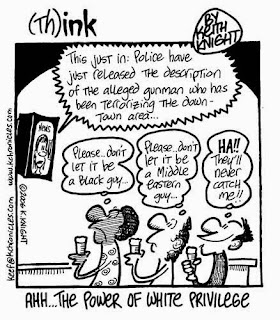As a white, hetero, cisgendered, able-bodied guy in America, I've got myself a boatload of privilege. I've had decades of receiving the message that I can do anything I want, and I don't really have to put much additional effort forth to get it. In hindsight, I can go look back to around Freshman year of high school when I started to consciously recognize that. I'm sure I didn't know what to call it back then, and I didn't even really understand it, but I think there were some flashes of recognition here and there.
Today, in 2015, it's something I'm significantly more aware of and, as I've noted here before, that's one of the reasons I started this "On -isms" column: to lend my privilege to the voices of those who don't have as much. I can only imagine some of the difficulties people-not-like-me face, but it's important to try to understand them as much as possible. And so, when I discuss works by people who have a very different perspective from my own, who are touching on themes I'm only intellectually familiar with but have never actually experienced, I try to come at the work as much from their perspective as possible. I'm sure I'm never completely successful, though, and I'm bound to make some slips.
I have to imagine that's difficult for some minority creators to see/hear. I have to imagine that they hear other white guys like me say their work is "too Black" or "too gay" or whatever. And even if phrases as blatant as those aren't used, I don't doubt that there's frequently undercurrents of that. That regardless of how well-executed a work is, it's put under exceptional scrutiny for the sole purpose of finding faults to dismiss the work, so the person can get back to their safe "mainstream" superhero genre. Because of that, I have to imagine that a lot of minority creators then become understandably sensitive to criticism from anyone outside their group. Intentional or not, a lot us white, hetero, cisgendered, able-bodied dudes can also be self-righteous, conceited assholes when it comes to checking our privilege, and it's easy to see why a minority creator might come to expect a casual dismissal of their work because of their minority status.
I had a piece a month or two back where I refered to trans people as "transgendered people." I didn't realize/understand at the time that the "-ed" is incorrect. Fortunately, a friend was able to correct me on that, and I corrected the piece shortly afterward. Had she not corrected me, though, someone else who didn't know me as well might have seen that, and assumed it was a deliberate slight of some sort. Again, coming from my chair of privilege, I can only begin to imagine the challenges a trans person might have, and how they might have been sensitized to deliberate mis-labeling. I could/would apologize, of course, but the damage would already have been done: they would think I'm a dick and, more significantly, they would walk away with a reinforced stereotype when the next ignorant, but well-meaning, white dude steps into their sphere.
Where I'm headed with this is: if you're sitting there in whatever chair of privilege you might have and you unintentionally say something that offends a minority, I think the best approach is to own up to your own ignorance. "Sorry, I thought that phrase meant..." or "I didn't know that was considered offensive..." or whatever. If your statement is being taken out of context, provide that context. But don't get defensive. Don't reinforce that stereotype of white guys oblivious to their own privilege who get upset when anyone points it out. Our society cultivates a level of ignorance for the privileged, but there's no reason you, as an individual, need to drop yourself down to that level. You're not likely to understand where someone else is coming from if you can't even understand where you're coming from.
Now Available!
Blog Archive
-
▼
2015
(253)
-
▼
May
(20)
- On Strips: Where Are the Comic Strip Cartoons?
- On -ism: The Wrong Response
- Weekly Comics Links
- On History: Secret Wars
- On Business: The Gift Economy
- On Strips: King Features Watches
- On -isms: Maybe Not So Banal?
- Weekly Comics Links
- On Business: Store Tours
- On Strips: Mr. Jack
- On -isms: Thor Thoughts
- Weekly Comics Links
- On History: Before Bradbury's First Story Adaption
- On Business: Comics Experiences
- On Strips: Festival Fundraising
- On -isms: How to Get Better
- Weekly Comics Links
- On History: Valueless?
- On Business: FCBD 2015
- On Strips: 1950s Promo?
-
▼
May
(20)








0 comments:
Post a Comment